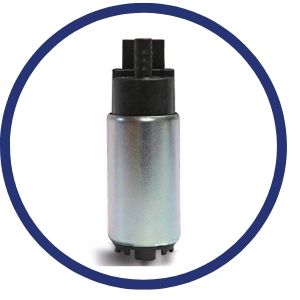One of the worst problems that can happen to a vehicle is a bad fuel pump. If your Mitsubishi Lancer’s fuel pump goes bad, no fuel (or not enough fuel depending on whether or not it’s out all the way) can enter the engine. Without gas your Lancer will not run at all. With that in mind, most of the symptoms of a bad fuel pump revolve around the vehicle stalling out or not running at all.
In modern fuel injected vehicles, the fuel pump sits right in the fuel tank and “pushes” the gasoline to the fuel rail(s). It is in the fuel tank because “pushing” fuel to the fuel rail is easier than “pulling” the fuel, which is what an inline pump would do. While being in the fuel tank makes the pump more reliable, it also makes it a lot more difficult to get to.
The good news is that fuel pumps are inexpensive. The bad news is that they cost a lot in terms of labor to repair and replace.
Mitsubishi Lancer Bad Fuel Pump Symptoms
There are physical signs that you can feel when your Lancer’s fuel pump is going out. Before taking anything apart, check to see if your engine’s computer has any trouble codes saved in it.
The engine may throw a P0087 trouble code. This trouble code detects that the fuel rail/system pressure is too low. Any trouble codes that exist could be a clue.
Sometimes when there is low fuel pressure, you may also get an oxygen sensor related trouble code as well. The real issue with diagnosing a bad fuel pump is that it resembles many other vehicular issues in terms of symptoms. Also, the symptoms are almost exactly the same as bad/clogged fuel filter.
Here are the most common symptoms of a bad fuel pump in your Mitsubishi Lancer:
Whining Noise
One of the most common signs that a fuel pump is going bad is a whining sound. The whining sound can indicate that the fuel pump is going out before there are any performance based issues. Keeping an open ear can save you from getting stuck somewhere with a bad fuel pump. It’ll sound like a low frequency buzzing sound.
Sputtering Under Acceleration
The only way that you are going to know that your Lancer’s fuel pump is going out is that it is no longer providing enough fuel pressure to keep the engine running under a heavy load, or at high-speed. Typically, if you are heading up a hill (or accelerating) the engine may start to feel like it is just running out of steam. That’s what it feels like with a bad fuel pump.
Now, a bad fuel pump can also feel a heck of a lot like a bad catalytic converter. Both conditions will make the motor feel like it is running out of wind when you hit the gas. A bad catalytic converter will not feel as jarring. It’s a smooth lack of power. If you are unsure, check out this article on troubleshooting catalytic converters. If you get P0420 or P0430 trouble codes with a scanner, it very well may be the catalytic converter causing these symptoms.
Challenges Starting the Engine
One of the best indicators of a clogged fuel pump is going to be that the your Lancer is difficult to start. This because there’s not enough fuel pressure to properly atomize the fuel as it enters the combustion chamber.
If your Lancer is difficult to start, a bad fuel pump would probably not be the place to start looking, especially if you are’t getting a fuel related trouble code.
Instead, we’d recommend taking a look at the ignition system first. Often it’ll be bad spark plugs, or a bad coil pack.
Engine Won’t Start
If the fuel pump has completely failed, the engine won’t start at all.
At the most basic of levels your Mitsubishi Lancer needs three things to start: Air, fuel, and spark. If any of these things aren’t present, the engine won’t turn over at all. If there’s been zero warning that the fuel pump could be going bad (hesitation, difficulty starting, etc) then it should not be automatically assumed that the fuel pump is at fault.
Here’s a great youtube video on how to test a fuel filter:
d
It Could Also be Your Lancer’s Fuel Filter
A fuel pump that is going out is going to feel the same as a bad fuel filter. This makes telling if you have a bad fuel pump vs bad fuel filter very challenging.
How do you tell them apart? A clogged fuel filter will have high pressure on its input side and low pressure on its output side. A bad fuel pump will have low pressure on both sides.
They are both going to cause the same hesitation at high speed and difficulty starting. The only way to truly tell is to place a fuel pressure gauge on both sides of the line and get a reading from both.
If your car isn’t starting at all, and you hear the fuel pump prime that is usually a good indication that the pump is working to some capacity. Testing your Lancer’s fuel pressure on each side of the pump would be the best way to diagnose this problem.
A priming fuel pump sounds like a high-pitched whine for a few seconds and can be heard with a sharp engine right after the ignition key is turned, but before the starter is engaged.
Conclusion: Mitsubishi Lancer Bad Fuel Pump
The symptoms of a bad fuel pump match a lot of other common problems that can occur in the Mitsubishi Lancer. Testing the pump and pressure on each side of it are going to be the quickest ways to rule it out. If there is anything you would like to add, please leave a comment below. Good luck!


